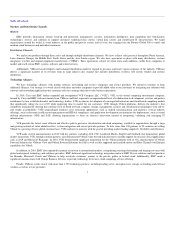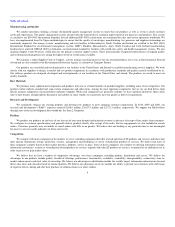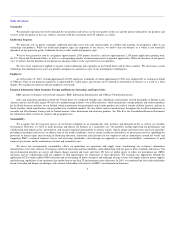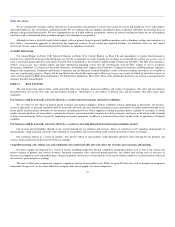EMC 2010 Annual Report Download - page 18
Download and view the complete annual report
Please find page 18 of the 2010 EMC annual report below. You can navigate through the pages in the report by either clicking on the pages listed below, or by using the keyword search tool below to find specific information within the annual report.
Table of Contents
Education Jobs and Medicaid Assistance Act), which included several international tax provisions with minimal impact on the Company's effective tax
rate. Although the scope of future changes is unclear, revisions to the taxation of international income continue to be a topic of conversation for the Obama
Administration and the U.S. Congress. As the enactment of some or all of these proposals could increase the Company's effective tax rate and adversely affect
our profitability, we will continue to monitor them.
During 2010, the IRS announced and finalized Schedule UTP, Uncertain Tax Positions Statement. This schedule is an annual disclosure of certain
federal UTPs, ranked in order of magnitude. According to the IRS, the disclosure is to include "a concise description of the tax position, including a
description of the relevant facts affecting the tax treatment of the position and information that reasonably can be expected to apprise the Service of the
identity of the tax position." As a result of this disclosure, the amount of taxes we would have to pay in the future could increase.
In December 2010, the President signed into law H.R. 4853, Tax Relief, Unemployment Insurance Reauthorization, and Job Creation Act of 2010,
which included an extension of a number of expired tax provisions retroactively to 2010 and prospectively through 2011. Among the extended tax provisions
was the research and development tax credit, which provides a significant reduction in our effective tax rate. The renewal of this credit beyond 2011 is
uncertain.
Changes in regulations could materially adversely affect us.
Our business, results of operations or financial condition could be materially adversely affected if laws, regulations or standards relating to us or our
products are newly implemented or changed. In addition, our compliance with existing regulations may have a material adverse impact on us. Under
applicable federal securities laws, including the Sarbanes-Oxley Act of 2002, we are required to evaluate and determine the effectiveness of our internal
control structure and procedures for financial reporting. Should we or our independent auditors determine that we have material weaknesses in our internal
controls, our results of operations or financial condition may be materially adversely affected or our stock price may decline. In March 2010, President Obama
signed into law a comprehensive health care reform package. We cannot currently determine the impact that such legislation could have on our business,
results of operations or financial condition.
Changes in generally accepted accounting principles may adversely affect us.
From time to time, the Financial Accounting Standards Board ("FASB") promulgates new accounting principles that could have a material adverse
impact on our results of operations or financial condition. The FASB is currently contemplating a number of new accounting pronouncements which, if
approved, could materially change our reported results. Such changes could have a material adverse impact on our results of operations and financial position.
Our business could be materially adversely affected as a result of the risks associated with acquisitions and investments.
As part of our business strategy, we seek to acquire businesses that offer complementary products, services or technologies. These acquisitions are
accompanied by the risks commonly encountered in an acquisition of a business, which may include, among other things:
• the effect of the acquisition on our financial and strategic position and reputation;
• the failure of an acquired business to further our strategies;
• the failure of the acquisition to result in expected benefits, which may include benefits relating to enhanced revenues, technology, human resources,
cost savings, operating efficiencies and other synergies;
• the difficulty and cost of integrating the acquired business, including costs and delays in implementing common systems and procedures and costs
and delays caused by communication difficulties or geographic distances between the two companies' sites;
• the assumption of liabilities of the acquired business, including litigation-related liability;
• the potential impairment of acquired assets;
• the lack of experience in new markets, products or technologies or the initial dependence on unfamiliar supply or distribution partners;
• the diversion of our management's attention from other business concerns;
• the impairment of relationships with customers or suppliers of the acquired business or our customers or suppliers;
• the potential loss of key employees of the acquired company; and
• the potential incompatibility of business cultures.
These factors could have a material adverse effect on our business, results of operations or financial condition. To the extent that we issue shares of our
common stock or other rights to purchase our common stock in connection with any future acquisition, existing shareholders may experience dilution.
Additionally, regardless of the form of consideration issued, acquisitions could negatively impact our net income and our earnings per share.
17
























